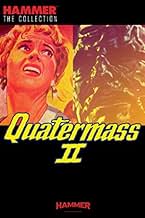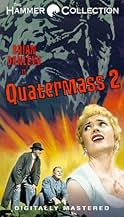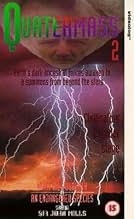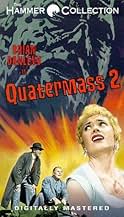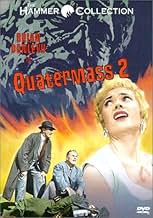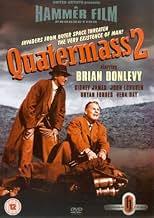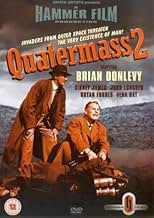IMDb-BEWERTUNG
6,7/10
5143
IHRE BEWERTUNG
Professor Quatermass, der versucht, Unterstützung für sein Mondkolonisationsprojekt zu sammeln, ist fasziniert von mysteriösen Spuren, die aufgetaucht sind.Professor Quatermass, der versucht, Unterstützung für sein Mondkolonisationsprojekt zu sammeln, ist fasziniert von mysteriösen Spuren, die aufgetaucht sind.Professor Quatermass, der versucht, Unterstützung für sein Mondkolonisationsprojekt zu sammeln, ist fasziniert von mysteriösen Spuren, die aufgetaucht sind.
John Longden
- Lomax
- (as John Longdon)
Sidney James
- Jimmy Hall
- (as Sydney James)
Empfohlene Bewertungen
This film was actually the first sequel to use a number in the title (although it's American title was "Enemy from Space"). Not only was this a cleverly written film, based on Nigel Kneale's screenplay, but it was a cruel satire on English and American culture in the 1950s.
In a nutshell, Professor Bernard Quatermass, leader of England's rocket group, is at wit's end trying to get more funding for his projected moon project. The British government decides it has "projects of far greater importance.'' At the same time, workers at Quatermass' base detect scores of what look like meteorites falling close by. When Quatermass investigates, he not only finds remnants of the meteorites, but his moon base, conveniently appropriated by an unknown government entity. His lab assistant picks up one of the meteorites and it explodes in his face, immediately infecting him with an alien parasite.
Quatermass is forced to go it almost alone, helped by a cynical police inspector, a drunken beat reporter and a vigilant member of parliament who can't get even his own party members to question where millions of pounds of tax dollars are going to.
The cruel satire comes from the comparison of Western governments of the 1950s to the communist governments they vehemently opposed during the Cold War years. British citizens were taught to implicitly trust government even as it spent millions to unknowingly fund an alien invasion. Civilian workers were so glad to have jobs they don't question why the supposed "synthetic food" plant they're building needs huge doses of toxic gases like ammonia. Even when evidence of wrongdoing is brought up, government red tape squelches it.
As for the movie itself, it is much better written than the original ("The Quatermass Experiment"). Nigel Kneale softens Quatermass' dour and brusk personality. Director Val Guest effectively uses a string musical score to build a creepy atmosphere. He and Kneale even overcome the first movie's dull ending, which had an alien getting electrocuted with no suspense whatsoever. Here, the plant workers, angry that one of their own is carted away by infected security guards at gunpoint, try to storm the plant, turning the aliens' carefully planned invasion on its ear. The irony, of course, is that the plant was conceived because government bureaucracy kept it secret. Now, as the plant is threatened, the same secrecy prevents the aliens from calling for help from the police or armed forces.
The special effects are better in this film, though the giant aliens at the end are not as convincing as they could be. Still, the film is a great example of British science fiction, which relied more on plot and characterization than the special effects that dominated American science fiction.
In a nutshell, Professor Bernard Quatermass, leader of England's rocket group, is at wit's end trying to get more funding for his projected moon project. The British government decides it has "projects of far greater importance.'' At the same time, workers at Quatermass' base detect scores of what look like meteorites falling close by. When Quatermass investigates, he not only finds remnants of the meteorites, but his moon base, conveniently appropriated by an unknown government entity. His lab assistant picks up one of the meteorites and it explodes in his face, immediately infecting him with an alien parasite.
Quatermass is forced to go it almost alone, helped by a cynical police inspector, a drunken beat reporter and a vigilant member of parliament who can't get even his own party members to question where millions of pounds of tax dollars are going to.
The cruel satire comes from the comparison of Western governments of the 1950s to the communist governments they vehemently opposed during the Cold War years. British citizens were taught to implicitly trust government even as it spent millions to unknowingly fund an alien invasion. Civilian workers were so glad to have jobs they don't question why the supposed "synthetic food" plant they're building needs huge doses of toxic gases like ammonia. Even when evidence of wrongdoing is brought up, government red tape squelches it.
As for the movie itself, it is much better written than the original ("The Quatermass Experiment"). Nigel Kneale softens Quatermass' dour and brusk personality. Director Val Guest effectively uses a string musical score to build a creepy atmosphere. He and Kneale even overcome the first movie's dull ending, which had an alien getting electrocuted with no suspense whatsoever. Here, the plant workers, angry that one of their own is carted away by infected security guards at gunpoint, try to storm the plant, turning the aliens' carefully planned invasion on its ear. The irony, of course, is that the plant was conceived because government bureaucracy kept it secret. Now, as the plant is threatened, the same secrecy prevents the aliens from calling for help from the police or armed forces.
The special effects are better in this film, though the giant aliens at the end are not as convincing as they could be. Still, the film is a great example of British science fiction, which relied more on plot and characterization than the special effects that dominated American science fiction.
The Quatermass Xperiment had been a major success for Hammer upon its release in 1955, becoming the company's biggest grossing film up to that time. Moving quickly to capitalise, Hammer Film Productions put together the elements for the sequel, Quatermass 2 (AKA Enemy From Space). Val Guest once again directs and co writes with Quatermass creator Nigel Kneale, Brian Donlevy returns as the irrepressible professor Quatermass, James Bernard scores and Anthony Hinds is again on production duties. Joining Donlevy in the cast are John Longden, Sid James, Bryan Forbes, William Franklyn & Vera Day. The plot sees Quatermass investigating meteorites that have been falling at Winnerden Flats. Whilst up in the Winnerden Valley, Quatermass and his colleague, Marsh, discover a huge power plant complex that looks suspiciously like the model Quatermass has been working on as part of a potential colonisation of the Moon. When Marsh is burnt by one of the meteorites, guards appear from nowhere and take him away down in the valley. Just what is going on at this strange plant? Quartermass intends to find out, but Winnerden has many secrets, secrets that could spell doom for mankind.
A sequel that is at least the equal of its predecessor, Quatermass 2 deals in politico paranoia and chilly alien invasion hysteria. Similar to Don Siegel's excellent Invasion Of The Body Snatchers from the previous year, the film doesn't rely on shlonky shocks to make its heart beat. There's much sci-fi discussion and jobs-worth like characters that are easy to follow, but all serve a purpose as Winnerden's secret starts to show its cards. As Quatermass' trail leads to the higher echelons of power, the paranoiac feel of the piece really kicks in, with the mood greatly enhanced by Gerald Gibbs' monochrome photography and Guest's imaginative use of hand held cameras for certain scenes. The effects work is clever and does its job, while the cast work hard to make the effective story work. Tho the film made good money it was overshadowed by the huge success of Hammer's release of The Curse Of Frankenstein the same year, while the film wasn't given much promotional help from Kneale who was very critical of the finished product. With much of his scorn directed towards Donlevy who he always felt was wrong for the role of the intrepid boffin. With that in mind, it's perhaps unsurprising to find the film still today is very divisive among critics and sci-fi fans alike. So you take your chance then. Personally I think it's one of the best sci-fi movies to have come out of Britian. As was the first film, and as was Quatermass And The Pit from 1967. Pretty great trilogy actually. 8/10
A sequel that is at least the equal of its predecessor, Quatermass 2 deals in politico paranoia and chilly alien invasion hysteria. Similar to Don Siegel's excellent Invasion Of The Body Snatchers from the previous year, the film doesn't rely on shlonky shocks to make its heart beat. There's much sci-fi discussion and jobs-worth like characters that are easy to follow, but all serve a purpose as Winnerden's secret starts to show its cards. As Quatermass' trail leads to the higher echelons of power, the paranoiac feel of the piece really kicks in, with the mood greatly enhanced by Gerald Gibbs' monochrome photography and Guest's imaginative use of hand held cameras for certain scenes. The effects work is clever and does its job, while the cast work hard to make the effective story work. Tho the film made good money it was overshadowed by the huge success of Hammer's release of The Curse Of Frankenstein the same year, while the film wasn't given much promotional help from Kneale who was very critical of the finished product. With much of his scorn directed towards Donlevy who he always felt was wrong for the role of the intrepid boffin. With that in mind, it's perhaps unsurprising to find the film still today is very divisive among critics and sci-fi fans alike. So you take your chance then. Personally I think it's one of the best sci-fi movies to have come out of Britian. As was the first film, and as was Quatermass And The Pit from 1967. Pretty great trilogy actually. 8/10
I first saw this film once when I was about five or six years old on TV. Because the film had location shooting at an oil refinery, for years I was always reminded of this film when ever I drove past one, wondering if something sinister was going on inside those tanks. However, soon after I first saw this film, QUATERMASS 2 (or ENEMY FROM SPACE-as it was called here in the USA), was pulled from distribution for various legal reasons, and this film was for years impossible to view. Then the film was released from its legal limbo in the mid eighties and I purchased a video copy as soon as it came out.
Unlike so many hard to view films that have been promoted as "a long lost classic", that often turn out not to live up to their reputations when finally viewed again*, QUATERMASS 2 truly deserves its reputation as a rediscovered lost classic. It is one of the best British science fictions films from the fifties.
The films acting and direction are uniformly good. The black and white photography is excellent and the film has an excellent musical score (although sometimes the music is a bit too loud.) The scene where the giant aliens burst from the domes is one of my favorite scenes in a fantastic film. Its like something out of a nightmare: the dome begins to crack, like a giant egg, and emerging from is not a cute little chick, but a hideous malignancy. The gloomy dark gray lighting enhance this scene. However, the aliens that emerge, while gross and repulsive looking when viewed for the first time, begin to look a tad bit silly after repeated viewings.
Perhaps one of the most interesting thing about this film when viewed today, is the films story has many similarities to the "Area 51" mythology. In the film there is government owned plant where everything is top secret, it gets unlimited tax payer funding, but no one in the government dare asks whats going on. This sounds lot like what we are told about the so-called "Area 51." I'm surprised " psycho/social reductionists" like Curtis "Watch The Skies" Peebles overlooked this film. Then again, maybe we are lucky they have.
QUATERMASS 2 is an excellent fifties science fiction that should be more widely shown. Like the other films in the famous "Quatermass" series, its literate, suspenseful and thrilling.
*Sometimes the films promoted as "long lost classics" aren't even lost!
Unlike so many hard to view films that have been promoted as "a long lost classic", that often turn out not to live up to their reputations when finally viewed again*, QUATERMASS 2 truly deserves its reputation as a rediscovered lost classic. It is one of the best British science fictions films from the fifties.
The films acting and direction are uniformly good. The black and white photography is excellent and the film has an excellent musical score (although sometimes the music is a bit too loud.) The scene where the giant aliens burst from the domes is one of my favorite scenes in a fantastic film. Its like something out of a nightmare: the dome begins to crack, like a giant egg, and emerging from is not a cute little chick, but a hideous malignancy. The gloomy dark gray lighting enhance this scene. However, the aliens that emerge, while gross and repulsive looking when viewed for the first time, begin to look a tad bit silly after repeated viewings.
Perhaps one of the most interesting thing about this film when viewed today, is the films story has many similarities to the "Area 51" mythology. In the film there is government owned plant where everything is top secret, it gets unlimited tax payer funding, but no one in the government dare asks whats going on. This sounds lot like what we are told about the so-called "Area 51." I'm surprised " psycho/social reductionists" like Curtis "Watch The Skies" Peebles overlooked this film. Then again, maybe we are lucky they have.
QUATERMASS 2 is an excellent fifties science fiction that should be more widely shown. Like the other films in the famous "Quatermass" series, its literate, suspenseful and thrilling.
*Sometimes the films promoted as "long lost classics" aren't even lost!
'Quatermass 2' is even better than the excellent 'The Quatermass Xperiment'. Like the first movie it was a remake of the original British TV production which I have sadly not seen (both are lost I think). Val Guest directs once again, Brian Donlevy reprises the role of the crusty Professor Quatermass, and this time Nigel Kneale was allowed to adapt his own original script, which probably explains why it improves on the first movie. Quatermass stumbles across a mysterious secret Government installation which is supposedly developing synthetic food, but is in fact something quite different and frightening. Donlevy isn't my favourite Quatermass but he is better here than in the first movie, and the supporting cast includes John Longden in the role originally played by Jack Warner, Bryan Forbes as Quatermass' assistant Marsh (another change of actor), comedian Sid James of 'Carry On' fame, and Hammer regular Michael Ripper. 'Quatermass 2' is a very entertaining and suspenseful thriller, which hasn't dated as half as much as you'd expect. It will particularly be interesting to fans of 'Invasion Of The Body Snatchers', which it shares certain themes with, and 'The X-Files', which many people, myself included, would argue owes this movie and the next in the series 'Quatermass and the Pit' a large debt. Nigel Kneale is one of the most underrated writers of SF and horror of our time (over 80 years old and still active!), and the Quatermass movies are his best known and enjoyable achievements. I highly recommend them all.
The second of the Quatermass films (the first was THE QUATERMASS XPERIMENT, the "X" used to emphasise the adult X-rating the film received on its initial release) was allowed a slightly larger budget and benefited enormously from Nigel Kneale's participation in the screenplay. In this film, at least Brian Donlevy behaves a little more like Quatermass ought to, though I still don't think he was right for the part.
For my money, Quatermass should be a pipe-smoking English boffin with leather patches sewn on the elbows of his jacket. The original character was conceived as a kind of Barnes Wallis type, as portrayed by Michael Redgrave in THE DAM BUSTERS.
The movie is set in a post-war Britain that was a little panicked by the idea of nuclear weapons and even more unsettled by the knowledge that our former allies, The Soviets, had the same weapons and they were pointed at us. This was the climate that gave us Orwell's 1984 and Don Siegel's INVASION OF THE BODY SNATCHERS. Paranoia was out to get us ...
This same atmosphere lasted well into the 1960s and can also be glimpsed in TV shows like THE AVENGERS. This was the era I grew up in, so I speak from personal experience :-)
This movie is one of Hammer's better offerings of the period. Released the same year as CURSE OF FRANKENSTEIN, it more than holds its own against the other, better-known Hammer colour offerings. Indeed, it benefits from its monochrome photography, which brilliantly communicates the austerity of the years immediately following WWII.
Thoroughly recommended, this film will appeal to anyone who can get beyond the admittedly primitive 1950s special effects to be rewarded by the rich and clever story that lies beneath the slightly dodgy veneer ...
For my money, Quatermass should be a pipe-smoking English boffin with leather patches sewn on the elbows of his jacket. The original character was conceived as a kind of Barnes Wallis type, as portrayed by Michael Redgrave in THE DAM BUSTERS.
The movie is set in a post-war Britain that was a little panicked by the idea of nuclear weapons and even more unsettled by the knowledge that our former allies, The Soviets, had the same weapons and they were pointed at us. This was the climate that gave us Orwell's 1984 and Don Siegel's INVASION OF THE BODY SNATCHERS. Paranoia was out to get us ...
This same atmosphere lasted well into the 1960s and can also be glimpsed in TV shows like THE AVENGERS. This was the era I grew up in, so I speak from personal experience :-)
This movie is one of Hammer's better offerings of the period. Released the same year as CURSE OF FRANKENSTEIN, it more than holds its own against the other, better-known Hammer colour offerings. Indeed, it benefits from its monochrome photography, which brilliantly communicates the austerity of the years immediately following WWII.
Thoroughly recommended, this film will appeal to anyone who can get beyond the admittedly primitive 1950s special effects to be rewarded by the rich and clever story that lies beneath the slightly dodgy veneer ...
Wusstest du schon
- WissenswertesThis is believed to be the first film ever to use the arabic numeral 2 as an indicator that it was the sequel to another film (as opposed to Roman numerals).
- PatzerWhen hurrying to the phone in the Pressure Control Block, McLeod puts down his jacket, which slips to the floor. It appears to have returned to where he originally placed it when he retrieves it in another shot, however.
- Zitate
Quatermass: They tell me you have no police here?
Dawson: Police? We don't need them - we're a law-abiding community, aren't we?
- VerbindungenFeatured in The Saturday Afternoon Movie: Enemy From Space (1966)
Top-Auswahl
Melde dich zum Bewerten an und greife auf die Watchlist für personalisierte Empfehlungen zu.
- How long is Quatermass 2?Powered by Alexa
Details
Box Office
- Budget
- 92.000 £ (geschätzt)
- Weltweiter Bruttoertrag
- 77 $
- Laufzeit
- 1 Std. 25 Min.(85 min)
- Farbe
Zu dieser Seite beitragen
Bearbeitung vorschlagen oder fehlenden Inhalt hinzufügen


